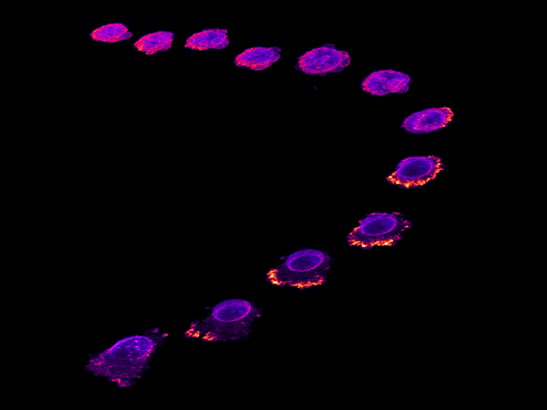
Image: Time lapse image of a breast cancer cell escaping the blood vessel layer during metastasis. Credit: Dr Maxine Lam (ICR)
Researchers have identified a genetic ‘switch’ in breast cancer cells that helps them spread around the body.
The early-stage research found that the genetic switch boosts production of a type of internal scaffolding, which may improve the ability of cancer cells to travel to other parts of the body.
The scaffolding is made from a type of protein called keratin 80 related to the substance that helps keep hair strong.
Boosting the amount of this scaffolding protein makes cancer cells more rigid, which the researchers say may help the cells clump together and travel in the bloodstream to other parts of the body.
The research was led by scientists from Imperial College London and The Institute of Cancer Research, London, who published their work in the journal Nature Communications.
Making cancer less likely to spread
The researchers studied human breast cancer cells in the lab treated with aromatase inhibitors – a common type of breast cancer drug.
The team found that the genetic switch is also involved in breast cancer cells becoming resistant to treatment with aromatase inhibitors, suggesting that there is a link between the cellular shape changes and the development of drug resistance.
And in women whose cancers had spread around the body, the cells contained higher amounts of the scaffolding protein, keratin 80.
If cancer cells evolve to develop resistance, then the original treatment will no longer work if the patient relapses and the cancer returns – often leaving the patient with no further treatment options.
Working out how resistance arises, and whether shape changes drive not only resistance but disease spread, could lead to the next step – looking into whether this switch could be targeted with different drugs to help reverse resistance and make cancer less likely to spread.
The researchers say larger-scale studies are now needed to confirm the findings, but that the findings could eventually help treat breast cancer that returns and spreads around the body.
We are building a new state-of-the-art drug discovery centre to create more and better drugs for cancer patients. To make our building a reality, we urgently need your philanthropic support.
Targeting breast cancer more effectively
Dr Fernando Calvo, who worked on the study as Team Leader in the Tumour Microenvironment at the ICR, said:
“Tumour evolution is one of the biggest challenges facing cancer researchers. By working out how tumours evolve drug resistance, we can find new ways to treat the cancer effectively, or even prevent resistance developing in the first place.
“Our study shows how drug resistance and the invasiveness of cancer cells are interconnected in breast cancer through changes in cell shape.
“If we understand how to block resistance, we might also be able to prevent the cancer spreading throughout the body – which would be an important step in treating breast cancer more effectively.”
A type of genetic switch
Dr Luca Magnani, lead author of the research from the Department of Surgery and Cancer at Imperial College London, said:
“Breast cancer is the most common cancer in the U.K., and causes 55,200 new cases every year. Aromatase inhibitors are effective at killing cancer cells, but within a decade post-surgery around 30 per cent of patients will relapse and see their cancer return – usually because the cancer cells have adapted to the drug.
“Even worse, when the cancer comes back it has usually spread around the body – which is difficult to treat.
“Up until now we didn’t know the reasons behind this, but our early-stage study suggests a type of genetic switch – called a transcription factor – can turn on genes that cause the cancer cells to not only become resistant to the treatment, but move into healthy tissue around the body.
“This research now needs to be followed up with larger studies, but if confirmed, targeting this genetic switch could prevent cancer cells from becoming resistant to the drugs, and from spreading to other areas of the body.”